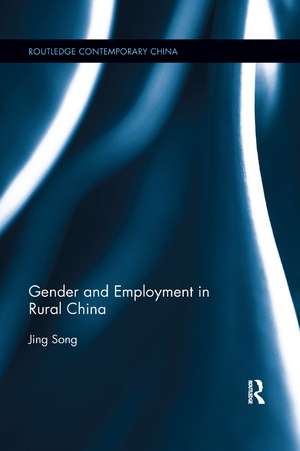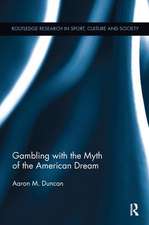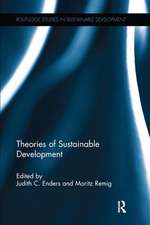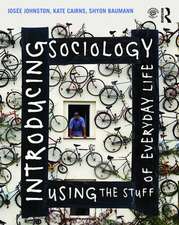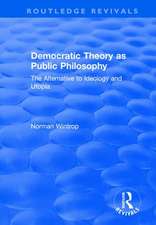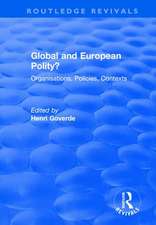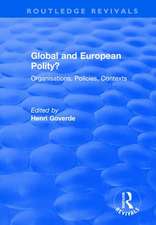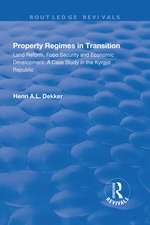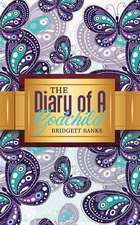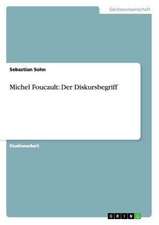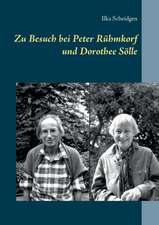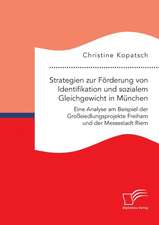Gender and Employment in Rural China: Routledge Contemporary China Series
Autor Jing Songen Limba Engleză Paperback – 23 ian 2019
Much of her research is centered on their various perceptions and reactions towards the market reforms. How are their lives reshaped through the employment transition? Along with the changes of family life and the diversification of development models, how do an individual’s gender and background play a role in determining employment? These are the broad questions that Song addresses through detailed analysis of four different villages, in light of China’s move towards decentralization of its rural economy.
| Toate formatele și edițiile | Preț | Express |
|---|---|---|
| Paperback (1) | 416.22 lei 43-57 zile | |
| Taylor & Francis – 23 ian 2019 | 416.22 lei 43-57 zile | |
| Hardback (1) | 997.11 lei 43-57 zile | |
| Taylor & Francis – 5 mai 2017 | 997.11 lei 43-57 zile |
Din seria Routledge Contemporary China Series
-
 Preț: 311.14 lei
Preț: 311.14 lei -
 Preț: 339.64 lei
Preț: 339.64 lei -
 Preț: 311.41 lei
Preț: 311.41 lei -
 Preț: 280.32 lei
Preț: 280.32 lei -
 Preț: 310.31 lei
Preț: 310.31 lei -
 Preț: 350.10 lei
Preț: 350.10 lei - 18%
 Preț: 1059.45 lei
Preț: 1059.45 lei - 26%
 Preț: 848.57 lei
Preț: 848.57 lei - 18%
 Preț: 1223.21 lei
Preț: 1223.21 lei - 18%
 Preț: 1060.74 lei
Preț: 1060.74 lei -
 Preț: 422.90 lei
Preț: 422.90 lei - 18%
 Preț: 954.20 lei
Preț: 954.20 lei - 18%
 Preț: 1169.66 lei
Preț: 1169.66 lei - 18%
 Preț: 1049.84 lei
Preț: 1049.84 lei - 18%
 Preț: 1217.95 lei
Preț: 1217.95 lei - 18%
 Preț: 1222.16 lei
Preț: 1222.16 lei - 25%
 Preț: 823.99 lei
Preț: 823.99 lei - 18%
 Preț: 1061.93 lei
Preț: 1061.93 lei - 18%
 Preț: 1057.89 lei
Preț: 1057.89 lei - 18%
 Preț: 1112.03 lei
Preț: 1112.03 lei - 18%
 Preț: 1008.02 lei
Preț: 1008.02 lei -
 Preț: 416.82 lei
Preț: 416.82 lei - 25%
 Preț: 823.99 lei
Preț: 823.99 lei - 18%
 Preț: 1114.70 lei
Preț: 1114.70 lei - 15%
 Preț: 702.39 lei
Preț: 702.39 lei - 25%
 Preț: 526.88 lei
Preț: 526.88 lei - 18%
 Preț: 712.13 lei
Preț: 712.13 lei - 18%
 Preț: 1065.06 lei
Preț: 1065.06 lei - 18%
 Preț: 703.09 lei
Preț: 703.09 lei - 18%
 Preț: 1060.87 lei
Preț: 1060.87 lei - 18%
 Preț: 1057.89 lei
Preț: 1057.89 lei - 18%
 Preț: 1062.98 lei
Preț: 1062.98 lei - 18%
 Preț: 1222.16 lei
Preț: 1222.16 lei - 18%
 Preț: 1055.51 lei
Preț: 1055.51 lei -
 Preț: 413.55 lei
Preț: 413.55 lei - 18%
 Preț: 1001.84 lei
Preț: 1001.84 lei -
 Preț: 386.57 lei
Preț: 386.57 lei - 18%
 Preț: 1055.38 lei
Preț: 1055.38 lei - 18%
 Preț: 1053.95 lei
Preț: 1053.95 lei - 18%
 Preț: 1061.57 lei
Preț: 1061.57 lei - 18%
 Preț: 1058.79 lei
Preț: 1058.79 lei - 18%
 Preț: 1109.18 lei
Preț: 1109.18 lei - 18%
 Preț: 1053.47 lei
Preț: 1053.47 lei - 18%
 Preț: 1053.16 lei
Preț: 1053.16 lei - 18%
 Preț: 728.24 lei
Preț: 728.24 lei - 18%
 Preț: 1055.38 lei
Preț: 1055.38 lei - 18%
 Preț: 1165.87 lei
Preț: 1165.87 lei - 18%
 Preț: 1227.38 lei
Preț: 1227.38 lei - 15%
 Preț: 701.45 lei
Preț: 701.45 lei
Preț: 416.22 lei
Nou
Puncte Express: 624
Preț estimativ în valută:
79.64€ • 83.38$ • 65.90£
79.64€ • 83.38$ • 65.90£
Carte tipărită la comandă
Livrare economică 07-21 aprilie
Preluare comenzi: 021 569.72.76
Specificații
ISBN-13: 9780367141875
ISBN-10: 0367141876
Pagini: 162
Ilustrații: 1 Line drawings, black and white; 13 Tables, black and white; 1 Illustrations, black and white
Dimensiuni: 156 x 234 x 9 mm
Greutate: 0.45 kg
Ediția:1
Editura: Taylor & Francis
Colecția Routledge
Seria Routledge Contemporary China Series
Locul publicării:Oxford, United Kingdom
ISBN-10: 0367141876
Pagini: 162
Ilustrații: 1 Line drawings, black and white; 13 Tables, black and white; 1 Illustrations, black and white
Dimensiuni: 156 x 234 x 9 mm
Greutate: 0.45 kg
Ediția:1
Editura: Taylor & Francis
Colecția Routledge
Seria Routledge Contemporary China Series
Locul publicării:Oxford, United Kingdom
Public țintă
Postgraduate and UndergraduateCuprins
List of Figures
List of Tables
Acknowledgements
Preface
Chapter 1 Introduction
Chapter 2 The Peasant Question and Gender Question
Chapter 3 Bei Village: Rural Industries and Private Businesses
Chapter 4 Su Village: Collective Legacy and the “New Socialist Countryside”
Chapter 5 Han Village: Urban Dream, Tied Migration and Male Bonding
Chapter 6 Ning Village: Integrated or Marginalized in Urbanization
Chapter 7 Conclusion
Index
List of Tables
Acknowledgements
Preface
Chapter 1 Introduction
Chapter 2 The Peasant Question and Gender Question
Chapter 3 Bei Village: Rural Industries and Private Businesses
Chapter 4 Su Village: Collective Legacy and the “New Socialist Countryside”
Chapter 5 Han Village: Urban Dream, Tied Migration and Male Bonding
Chapter 6 Ning Village: Integrated or Marginalized in Urbanization
Chapter 7 Conclusion
Index
Notă biografică
Jing Song is Assistant Professor at Gender Studies Programme, The Chinese University of Hong Kong.
Recenzii
'Song’s incredibly detailed descriptions and nuanced analysis of the relationships among modernization pathways, employment structures and patterns, household labor diversification strategies, and gender ideologies and roles in these four villages over the recent decades greatly complicates and enriches the existing picture of rural China as an undifferentiated and underdeveloped space. Through the fascinating case studies, we learn that the development process is variously shaped by careful policy design as well as the vicissitudes of geography, timing, leadership, and natural or social endowments. The separate treatment of each village makes cross-village comparison rather unwieldy, but produces a meticulous longitudinal study. This monograph will be of great value to scholars, graduate students, and advanced undergraduate students who wish to better understand socioeconomic change in contemporary rural China as well as the relationship between development and gender equality.' - Arianne M. Gaetano, Associate Professor of Anthropology, College of Liberal Arts, Auburn University, USA
'Drawing on her solid and thorough study of four Chinese villages characterized by different combinations of socialist legacies, patriarchal traditions, and market forces, the author has done an excellent job in addressing simultaneously the peasant question and gender question regarding the employment transition from farm to nonfarm sectors in the process of urbanization and industrialization in China. The book offers readers great insights into the interaction between developmental politics and gender relations with the intermediation of family dynamics in China. This book will be valuable reading for researchers interested in gender, employment transition and rural China.' - Yu Song, Associate Professor, Department of China Studies, Xi’an Jiaotong-Liverpool University, China
'China is in the processes of rapid industrialization, urbanization and marketization, but none of them follow a linear path. Chinese peasants move back and forth between the city and the countryside, between industry and agriculture, and between the job market and community-based collectives. In the context, gender relations and employment patterns, as Jing Song superbly demonstrates, must be understood as processes of on-going negotiations between individuals, family norms, and local economies. Firmly grounded in in-depth empirical research, this book sets an exemplar of multi-scalar, context-specific and comparative analysis that captures highly complex dynamics of social changes in China.' - Biao Xiang, Professor of Social Anthropology, University of Oxford, UK
'Song’s incredibly detailed descriptions and nuanced analysis of the relationships among modernization pathways, employment structures and patterns, household labor diversification strategies, and gender ideologies and roles in these four villages over the recent decades greatly complicates and enriches the existing picture of rural China as an undifferentiated and underdeveloped space. Through the fascinating case studies, we learn that the development process is variously shaped by careful policy design as well as the vicissitudes of geography, timing, leadership, and natural or social endowments. The separate treatment of each village makes cross-village comparison rather unwieldy, but produces a meticulous longitudinal study. This monograph will be of great value to scholars, graduate students, and advanced undergraduate students who wish to better understand socioeconomic change in contemporary rural China as well as the relationship between development and gender equality.' - Arianne M. Gaetano, Associate Professor of Anthropology, College of Liberal Arts, Auburn University, USA
'Drawing on her solid and thorough study of four Chinese villages characterized by different combinations of socialist legacies, patriarchal traditions, and market forces, the author has done an excellent job in addressing simultaneously the peasant question and gender question regarding the employment transition from farm to nonfarm sectors in the process of urbanization and industrialization in China. The book offers readers great insights into the interaction between developmental politics and gender relations with the intermediation of family dynamics in China. This book will be valuable reading for researchers interested in gender, employment transition and rural China.' - Yu Song, Associate Professor, Department of China Studies, Xi’an Jiaotong-Liverpool University, China
'China is in the processes of rapid industrialization, urbanization and marketization, but none of them follow a linear path. Chinese peasants move back and forth between the city and the countryside, between industry and agriculture, and between the job market and community-based collectives. In the context, gender relations and employment patterns, as Jing Song superbly demonstrates, must be understood as processes of on-going negotiations between individuals, family norms, and local economies. Firmly grounded in in-depth empirical research, this book sets an exemplar of multi-scalar, context-specific and comparative analysis that captures highly complex dynamics of social changes in China.' - Biao Xiang, Professor of Social Anthropology, University of Oxford, UK
"Complicating often oversimplified popular beliefs about Chinese modernization as a top-down, one-directional process dictated by the state, Jing Song’s Gender and Employment in Rural China (Routledge 2017) explores the situated and multi-dimensional influences on development, employment and migration in rural China. In particular, she demonstrates the complex ways that gender relations shape and are shaped by shifting norms, opportunities and identities within families, communities, workplaces and markets. Through rich ethnography in four different villages, Song provides in-depth and up-close examination of how urbanization does not simply involve massive migration from farms to factories, but that non-metropolitan areas and agricultural sectors themselves are transforming in dynamic and unpredictable patterns. This is a must-read for scholars interested in gender, work, family and development in China, and more broadly in how everyday social actors negotiate and influence massive social, political and economic transformations." -Miliann Kang, associate professor of Women, Gender, Sexuality Studies, University of Massachusetts, USA and author of 'The Managed Hand: Race, Gender and the Body in Beauty Service Work' (2010)
'Drawing on her solid and thorough study of four Chinese villages characterized by different combinations of socialist legacies, patriarchal traditions, and market forces, the author has done an excellent job in addressing simultaneously the peasant question and gender question regarding the employment transition from farm to nonfarm sectors in the process of urbanization and industrialization in China. The book offers readers great insights into the interaction between developmental politics and gender relations with the intermediation of family dynamics in China. This book will be valuable reading for researchers interested in gender, employment transition and rural China.' - Yu Song, Associate Professor, Department of China Studies, Xi’an Jiaotong-Liverpool University, China
'China is in the processes of rapid industrialization, urbanization and marketization, but none of them follow a linear path. Chinese peasants move back and forth between the city and the countryside, between industry and agriculture, and between the job market and community-based collectives. In the context, gender relations and employment patterns, as Jing Song superbly demonstrates, must be understood as processes of on-going negotiations between individuals, family norms, and local economies. Firmly grounded in in-depth empirical research, this book sets an exemplar of multi-scalar, context-specific and comparative analysis that captures highly complex dynamics of social changes in China.' - Biao Xiang, Professor of Social Anthropology, University of Oxford, UK
'Song’s incredibly detailed descriptions and nuanced analysis of the relationships among modernization pathways, employment structures and patterns, household labor diversification strategies, and gender ideologies and roles in these four villages over the recent decades greatly complicates and enriches the existing picture of rural China as an undifferentiated and underdeveloped space. Through the fascinating case studies, we learn that the development process is variously shaped by careful policy design as well as the vicissitudes of geography, timing, leadership, and natural or social endowments. The separate treatment of each village makes cross-village comparison rather unwieldy, but produces a meticulous longitudinal study. This monograph will be of great value to scholars, graduate students, and advanced undergraduate students who wish to better understand socioeconomic change in contemporary rural China as well as the relationship between development and gender equality.' - Arianne M. Gaetano, Associate Professor of Anthropology, College of Liberal Arts, Auburn University, USA
'Drawing on her solid and thorough study of four Chinese villages characterized by different combinations of socialist legacies, patriarchal traditions, and market forces, the author has done an excellent job in addressing simultaneously the peasant question and gender question regarding the employment transition from farm to nonfarm sectors in the process of urbanization and industrialization in China. The book offers readers great insights into the interaction between developmental politics and gender relations with the intermediation of family dynamics in China. This book will be valuable reading for researchers interested in gender, employment transition and rural China.' - Yu Song, Associate Professor, Department of China Studies, Xi’an Jiaotong-Liverpool University, China
'China is in the processes of rapid industrialization, urbanization and marketization, but none of them follow a linear path. Chinese peasants move back and forth between the city and the countryside, between industry and agriculture, and between the job market and community-based collectives. In the context, gender relations and employment patterns, as Jing Song superbly demonstrates, must be understood as processes of on-going negotiations between individuals, family norms, and local economies. Firmly grounded in in-depth empirical research, this book sets an exemplar of multi-scalar, context-specific and comparative analysis that captures highly complex dynamics of social changes in China.' - Biao Xiang, Professor of Social Anthropology, University of Oxford, UK
"Complicating often oversimplified popular beliefs about Chinese modernization as a top-down, one-directional process dictated by the state, Jing Song’s Gender and Employment in Rural China (Routledge 2017) explores the situated and multi-dimensional influences on development, employment and migration in rural China. In particular, she demonstrates the complex ways that gender relations shape and are shaped by shifting norms, opportunities and identities within families, communities, workplaces and markets. Through rich ethnography in four different villages, Song provides in-depth and up-close examination of how urbanization does not simply involve massive migration from farms to factories, but that non-metropolitan areas and agricultural sectors themselves are transforming in dynamic and unpredictable patterns. This is a must-read for scholars interested in gender, work, family and development in China, and more broadly in how everyday social actors negotiate and influence massive social, political and economic transformations." -Miliann Kang, associate professor of Women, Gender, Sexuality Studies, University of Massachusetts, USA and author of 'The Managed Hand: Race, Gender and the Body in Beauty Service Work' (2010)
Descriere
This book sheds light on the complicated effects that economic progression brings on the rural agricultural population in four villages. It closely analyses employment choices, and the economic and social factors which affect vocational opportunities in the Bei, Su, Ning and Yi villages. In studying these villages, this study highlights two dimensions of development contexts – of industrialization and urbanization.
